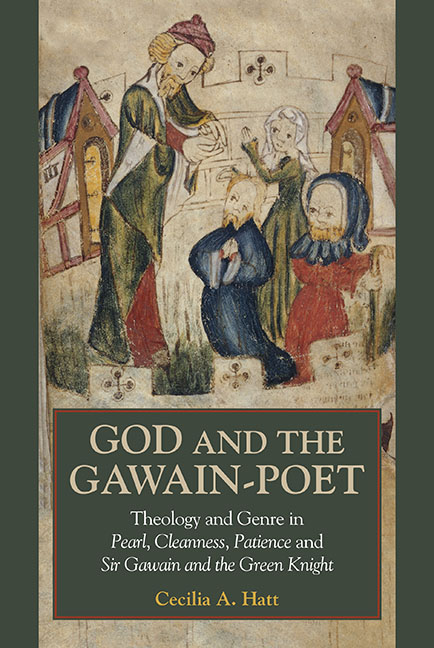 God and the Gawain-Poet
God and the Gawain-Poet Book contents
- Frontmatter
- Dedication
- Contents
- Preface and Acknowledgements
- Abbreviations
- Introduction: Signposts on the Trail of the Gawain-Poet
- Chapter 1 Pearl, the Jeweller’s Dream
- Chapter 2 The Difficulty of Cleanness
- Chapter 3 Patience and the Book of Jonah
- Chapter 4 Sir Gawain and the Green Knight: an Alternative Romance?
- Appendix: some Biographical and Contextual Speculations
- Select Bibliography
- Index
Chapter 4 - Sir Gawain and the Green Knight: an Alternative Romance?
Published online by Cambridge University Press: 07 May 2022
- Frontmatter
- Dedication
- Contents
- Preface and Acknowledgements
- Abbreviations
- Introduction: Signposts on the Trail of the Gawain-Poet
- Chapter 1 Pearl, the Jeweller’s Dream
- Chapter 2 The Difficulty of Cleanness
- Chapter 3 Patience and the Book of Jonah
- Chapter 4 Sir Gawain and the Green Knight: an Alternative Romance?
- Appendix: some Biographical and Contextual Speculations
- Select Bibliography
- Index
Summary
IN his article ‘Template Criticism: Sir Gawain and the Green Knight’, John Halverson attacks the critics who apply a single idea to the interpretation of SGGK and try to make everything in the poem fit into it:
once the template is imposed, it becomes tyrannical. It not only excludes other interpretations and clouds perception, but also sends the interpreter off into a multiplication of detailed identifications often so far-fetched that they arouse the amusement or scorn of all except other believers. It demands that everything be reduced to a single set of terms.
One knows, of course, exactly what he means and it is with particular relief, therefore, that one encounters less committed commentaries, such as W. A. Davenport’s, which offers such a detailed analysis of the Gawain-poet's characteristic style that several possible interpretations of SGGK seem to offer themselves without any one particularly insisting on primacy. Davenport's final chapter, ‘The Poet and his Art’, is an engagingly commonsensical summary of the effect the poems produce in the reader, together with sympathetic and perceptive comment on the means used to produce it. Davenport remarks, interestingly,
There is a reassurance in the continuity and enclosure of the poem's framing, but the narratives do not confirm the sense of security, for the impulse to realise, is, by its nature, an impulse to complicate and diversify, to qualify judgements, to perceive ironies, to modify moral lessons through experience.
Elsewhere, Davenport suggests that, in Pearl at least, the patterning may be too much of a good thing, but his general comment here: the narratives do not confirm the sense of security, is an almost perfect description of what happens to the reader of SGGK. However, both Halverson and Davenport make an assumption about the Gawain-poet's attitude to religion that needs to be examined, and this is that, whatever the preoccupations of the other three Cotton Nero poems (assuming that they were written by the same person), SGGK at any rate is a fundamentally non-religious poem. Davenport remarks
Clearly [the poet] was aware of theological ideas and debates about morality and salvation, though, in my view, he did not have a profound interest in either, except insofar as they could provide a framework for the imaginative exploration of situations and feelings.
- Type
- Chapter
- Information
- God and the Gawain-PoetTheology and Genre in <I>Pearl, Cleanness, Patience</I> and <I>Sir Gawain and the Green Knight</I>, pp. 168 - 223Publisher: Boydell & BrewerPrint publication year: 2015


